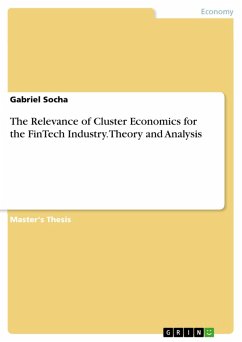Master's Thesis from the year 2020 in the subject Economics - Macro-economics, general, grade: 1,0, , language: English, abstract: This paper is about the relevance of cluster economics for the FinTech industry. While the FinTech industry overall has experienced strong growth in recent years, the geographical presence of FinTechs is not homogeneously distributed. Instead, it can be observed that certain FinTech hotspots are emerging. Within the political arena there is a discussion about how to make business locations more attractive for the accumulation of FinTechs. In this context the theory of economic clusters must be investigated. What are the underlying factors that contribute to the formation of FinTech clusters? This paper builds on initial studies on this topic and sheds light on various factors that could be decisive for the agglomeration of FinTechs. Using Michael Porter's Diamond Model, various factors were derived, which were then statistically examined using a data sample for the European Union. The results of the study show that besides the availability of positive externalities, such as specialized talent pools, universities, and accelerators, demand factors such as total market size, internet connectivity, and financial literacy are relevant. Furthermore, the results suggest that the presence of competitors and similar firms, as well as the strength of intellectual property protection laws, are related to the size of FinTech clusters. Based on the results, recommendations for policy makers and FinTech entrepreneurs are provided.
Dieser Download kann aus rechtlichen Gründen nur mit Rechnungsadresse in A, B, BG, CY, CZ, D, DK, EW, E, FIN, F, GR, HR, H, IRL, I, LT, L, LR, M, NL, PL, P, R, S, SLO, SK ausgeliefert werden.









